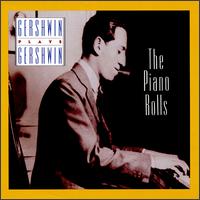Recording
Gershwin recorded these piano rolls between 1916 and 1927. Several rolls use overdubbing, so that Gershwin is in effect playing a four-handed piece solo.
The final selection, "An American In Paris", was recorded by Frank Milne in 1933. Milne worked as a roll-editor with Gershwin in the 1920s, and edited several of the rolls reproduced on this disc. So skilled was Milne as a roll editor, the liner notes suggest that he may not have actually "played" "An American In Paris" at all—in the same way that a musician can write sheet music, Milne was able to prepare roll masters by marking the lines on special graph paper that would be used as a template for the holes punched in the actual piano roll.
The piano rolls were played back on a 9-foot Yamaha Disklavier grand piano, augmented by a 1911 Pianola operated by Artis Wodehouse. The Pianola allows for the operator to add "live" effects with piano footpumps and expression levers.
This page is based on this
Wikipedia article Text is available under the
CC BY-SA 4.0 license; additional terms may apply.
Images, videos and audio are available under their respective licenses.
